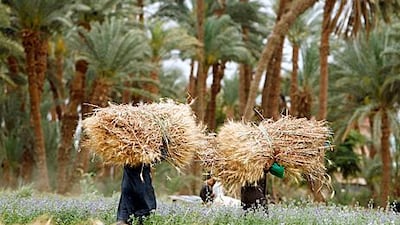Jenaan Investment, a privately owned company based in Abu Dhabi, plans to invest US$500 million (Dh1.83 billion) in the next three years developing its agriculture ventures abroad.
Jenaan has already spent $500m acquiring land abroad. It owns and leases properties in Egypt and Sudan, as well as leasing land in Tanzania, Ethiopia and the US. The contracts have 30-year, renewable leases.
Jenaan plans to spend the next five years developing its locations and then "we will look to expand", said Ahmed al Falasi, a board member of Jenaan.
Jenaan began growing animal feed in Egypt but is now also producing dill, wheat, maize and potatoes.
"In Egypt, for example, the farmers there didn't used to feed animals alfalfa," said Mr al Falasi. "Now they are taking more than 50 per cent of [alfalfa] production at market price."
Egypt is also among the world's biggest importers of wheat, consuming an average of 14 million tonnes of the cereal a year.
Launched in 2003, Jenaan has acquired 20,000 hectares in Sharq al Owainat, Egypt, 30km from the border with Sudan and 250km from the border with Libya. The company chooses arid areas that are unused by the local population, Mr al Falasi said.
In Sudan, Jenaan is developing more than 40,500ha.
"We still didn't develop all of our land," said Mr al Falasi.
He stressed the importance of investing in local infrastructure, adding that Jenaan had built houses, schools and clinics near its farms. The agricultural technology used to develop its projects, he said, was imported from the US and Europe.
"We hire people and teach them, we give people their technology," he said.
Mr al Falasi said lower labour costs made farming abroad an attractive option.
"You need a lot of people and we don't have any of these experienced people [in the UAE]," he said.
Private investment is urgently needed in the developing world, said Jacques Diouf, the director general of the Food and Agriculture Organisation.
As the keynote speaker at the first Middle East edition of the Salon International de l'Agroalimentaire (SIAL) event in Abu Dhabi this week, Mr Diouf stressed the importance of increasing private investment in agriculture.
The UN estimates an extra $70bn a year will have to be invested if the world is going to have enough food for its population in 2050.
The Gulf countries, which import about 90 per cent of their food, have been key players in developing land abroad. Food prices are increasing at a faster rate than before the previous peak in 2008.
One difference from 2008, however, is that there is 100 million tonnes more food in world reserves today, said Mr Diouf.
Imports alone cost the UAE about Dh11bn a year and Saudi Arabia, the region's largest food importer, more than Dh62bn.
Saudi Arabia is already paving the way for private investment through the King Abdullah initiative for Saudi agricultural investment abroad, which it launched last year.

